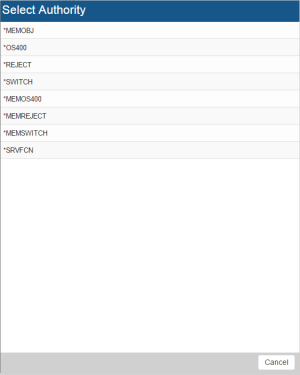This window allows you to specify an authority when adding or changing a rule.
How to get there
Choose Select next to the Authorities field when adding or changing a rule.
This list may include all or some of the following authorities, depending on the rule being defined.
*OS400 Network Security will use normal IBM i authority for the location. This is valid for both location and user.
*REJECT Network Security will reject requests for the specified location. This is valid for both location and user.
*SWITCH Network Security will use the authority of the switch profile for the specified location. A switch profile entry is required. This is valid for both location and user. To view the profile to be switched to view the expanded rule properties.
*MEMREJECT Check Memorized Transactions (MTR) for authority. If no MTR authority is encountered, Network Security will reject requests for the specified location. This is valid for both location and user.
*MEMOS4OO Check Memorized Transactions (MTR) for authority. If no MTR authority is encountered, Network Security will use normal OS/400 authority for the location. This is valid for both location and user.
*MEMUSR Check Memorized Transactions (MTR) for authority. If no MTR authority is encountered, Network Security will check server user authority. This is only valid for location.
*USER Network Security will check server user authority.
*MEMSWITCH Check Memorized Transactions (MTR) for authority. If no MTR authority is encountered, Network Security will use the authority of the switch profile for the specified location. A switch profile entry is required. This is valid for both location and user.
*MEMOBJ Memorized Transactions (MTR) are checked for authority first. If no MTR authority is encountered, Network Security will check any objects used in the transactions for authorities defined by Object Rules.
*SRVFCN Network Security will use the authority defined for the server/function. This is valid for both location and user.
*SAME Network Security will not change the existing settings and will not create new rules when the All Servers option is taken. This is valid for both location and user.
